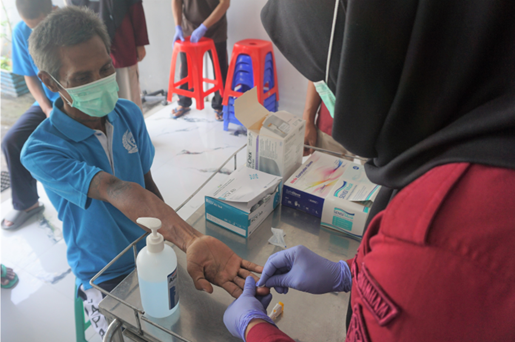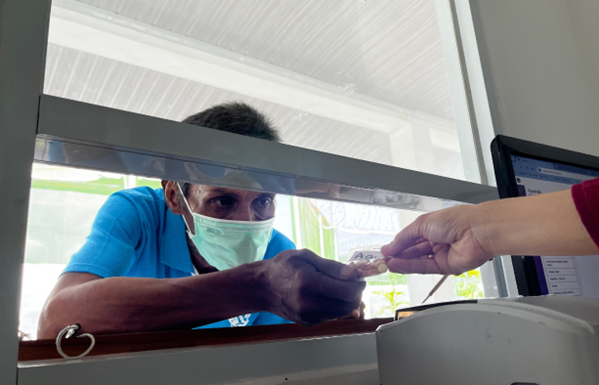In Narcotics Penitentiary Class IIA Jakarta, 45-year-old Agus found an unexpected path to healing. Like others serving time, he was unaware of the silent threat lurking inside him until a routine medical test changed his life.
"I didn't know I had hepatitis," Agus recalls. “I only noticed pain when I slept on my right side.” This small discomfort was a sign of something much more serious.

Agus being screened for hepatitis C. Credits: WHO/Bunga Manggiasih
At the facility, Agus was diagnosed with hepatitis C, a virus that if left untreated can cause severe liver problems. The virus spreads through contact with infected blood and is a significant health challenge in correctional facilities worldwide.
Since 2018, Indonesian authorities have implemented routine hepatitis C screening and treatment in seven correctional facilities. WHO has supported the intervention by developing guidelines and assisting in monitoring and evaluation of implementation. This year, the Government of Indonesia is also developing a National Action Plan for Prevention and Control of Hepatitis in correctional facilities throughout the nation.
Dr Finnahari, the hepatitis C programme officer at the facility, stresses how important these screenings are. "Early detection is key. This allows us to treat them promptly and prevent the spread of hepatitis C within the facility."
For Agus, this early detection may have saved his life. "By chance, there was a screening, and my name was called," he says. "When I was tested, it turned out to be positive."
After being diagnosed, Agus was put on a three-month treatment plan right away. The treatment he received is part of a newer, highly effective regimen known as direct-acting antivirals (DAA).

Healthcare workers in the clinic of Narcotics Penitentiary Class IIA Jakarta provide DAA medication for those diagnosed with hepatitis C. Credits: WHO/Bunga Manggiasih
Dr Alima Susilawati Sadrina, an internist at Pengayoman Hospital, which serves as the referral center for hepatitis C treatment in Jakarta's correctional facilities, explains how effective this treatment is. "The cure rate of DAA therapy exceeds 95%, consistent with global outcomes. When patients take the medicine regularly, they should recover completely.”
For Agus, the results were life-changing. "After taking the medicine for three months and being tested again, the results were negative," he says with relief. "Now my body feels good again. I can sleep on either side without any pain."
The success of Agus's treatment is not an isolated case. Between 2018 and 2023, screenings in several Indonesian correctional facilities identified 1746 individuals infected with hepatitis C, many of whom have since received treatment.
Agus believes these screenings and treatments should be available in more facilities. "It’s really helpful, especially for those serving long sentences who might not be able to seek treatment outside or afford it. Here, we’re lucky to receive free treatment."
Indonesia’s efforts to eliminate hepatitis C in prisons are setting an example for public health programmes the world over. By offering free screenings and treatment, Indonesia is ensuring that even people behind bars have the right to good healthcare. And as more prisons adopt these programmes, more people like Agus will have a chance to recover and live healthier lives, creating a safer, healthier community for everyone.
Written by Bunga Manggiasih, National Professional Officer (Communication), WHO Indonesia
